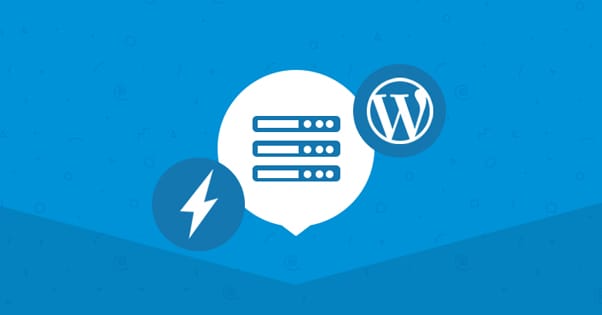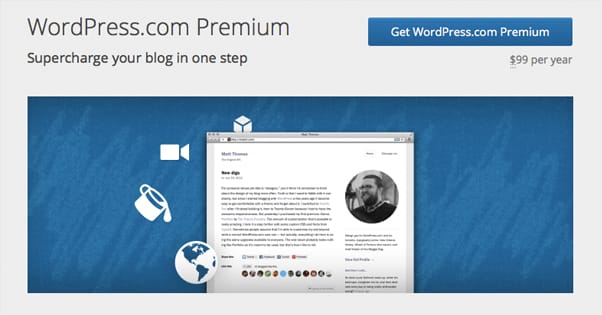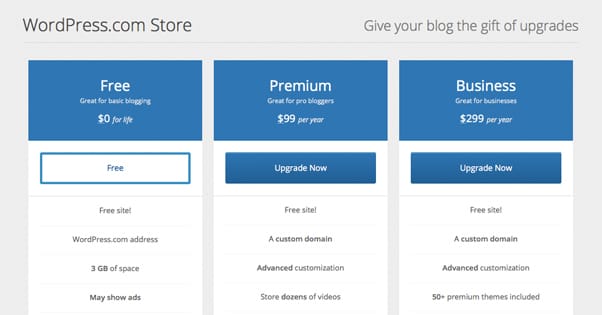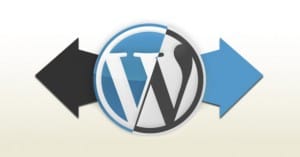WordPress.com Premium V.S. A Self Hosted WordPress Blog
Published by James Parsons • Search Engine Optimization • Posted September 20, 2015 ContentPowered.com
ContentPowered.com
WordPress is interesting, as a blogging platform. There are three forms of WordPress, though one is an upgrade of another. You have WordPress.com, which is the hosted solution. It’s like Blogger or Tumblr; WordPress themselves hosts your blog, with a blogname.wordpress.com URL. There’s WordPress.com Premium, which is an upgrade to WordPress.com. And then there’s WordPress.org, which is a set of software you download and put on your own web hosting, which you pay for and can configure to your heart’s content.
If your choice is between WordPress.com and WordPress.org, I feel as though the choice is clear. The additional options and flexibility of WordPress.org is vastly superior to the limited version of WordPress.com.
However, with the additional upgrades that come with WordPress.com Premium, it becomes a more difficult decision.
WordPress.com Premium Features
The premium upgrade for WordPress.com is actually pretty useful. It’s not without drawbacks, though, so let’s see what’s involved.
The first thing you get from Premium is a domain credit. You can use this credit to change your domain name to a custom domain name. This eliminates one of the primary drawbacks of using .com over .org; the domain limitations. You can have blogname.com instead of blogname.wordpress.com.
The second Premium feature is the ability to upload HD videos to WordPress.com. This is perfectly within your capabilities with a self-hosted site, of course. The service on WordPress.com is called VideoPress. It doesn’t advertise over your video, it doesn’t watermark your video, and it doesn’t try to brand your videos in any way.
The third feature of Premium is the ability to create a custom design. As you know, with WordPress.com, you’re severely limited in the options you can use to customize your site. You can only use certain approved themes, and you can only customize them in certain ways. This is to limit any potential security holes, and to maintain quality control and legality throughout the sites WordPress hosts.
With the expanded customization options, you can select fonts and colors within custom design options, or you can manually edit CSS for your site. It’s not as robust as all of your options with custom themes on WordPress.org, but it’s better than what you get with unupgraded WordPress.com.
The fourth feature is the no ads feature. WordPress.com can put ads on your page, to support themselves for hosting your site. With Premium, since you’re paying for the upgrade, you don’t suffer from their ads.
The fifth and final feature is a lot of extra space. WordPress.com space is limited, but with Premium, you get an additional 10 gigabytes of storage space. This is virtually necessary if you’re using VideoPress on any regular basis, but you’ll be surprised at how quickly you can use it up if you’re hosting a lot of multimedia.
What’s the cost for all of this? WordPress.com Premium costs you $99 annually, per site. It only applies to one site at a time, so if you have more than one blog you want to upgrade, you will have to buy the upgrade for each of them.
There’s also a tier above Premium, for Business bloggers. It’s $300 per year, and it includes access to dozens of premium themes, unlimited storage, an e-commerce platform, live chat support, and Google Analytics support. It’s useful if you want an e-commerce site, but if you’re really into a storefront and into growth, you’re going to want your own site for that, not something limited by WordPress.com.
One benefit to WordPress.com Premium is that each of those updates is purchasable on its own, but buying them in the one premium package is cheaper than the rest on their own.
The Benefits of Self-Hosted WordPress
So, let’s start off with the conventional wisdom. What makes WordPress.org the blog platform of choice for so many people around the web?
First of all is the amount of control you get. With WordPress.org, you control pretty much everything. You have the base WordPress installation, but you can use any theme you like, any plugin you like, or any custom code you like. You can hack the thing to pieces and do whatever you like. You can modify the source code, the CSS, the JavaScript, and anything else. The only limitations are on what you can get to work with real functional code, and what your web host lays on via their infrastructure. Even that is variable; just get different hosting if your current hosting isn’t doing it for you.
Secondly, you have access to unlimited themes. I mentioned that before, but it bears repeating on its own. WordPress.com Premium gives you around 50 themes you can access, and that’s on top of the 100 or so that are available to all users. Given the sheer number of .com blogs out there, none of those themes are any less used than any others. Your design will never be unique. On the other hand, with .org, you have an infinite number of themes. Heck, you can wireframe a theme in Photoshop and send it to one of the many PSD to WP services out there, to get a completely customized theme.
As an addendum to that, you can’t install frameworks with WordPress.com. WordPress.org gives you that ability. If you’re concerned about site speed, then you’ll want to look into the very popular Genesis Framework, which was designed from the ground up to be blazing fast. I’ve never seen a Genesis site load in more than a second.
There’s also plugin access. You don’t have plugins, at all, with the basic package of WordPress.com. When you upgrade to the premium, you… also get nothing. There’s VideoPress, but it’s not really that much. The .com version has some plugin-like functionality, but it’s still very limited. Compare that to the 39,900 plugins available on WordPress.org’s directory, plus the nearly 4,000 available on CodeCanyon, plus the ability to create them yourself.
Having your own domain name is incredibly important as well. For one thing, it’s invaluable for your branding. If you’re trying to build a legitimate brand and business, naming yourself with a .wordpress.com is like starting out a 100 meter dash with your ankles tied together. Sure, you can work your way past the limitation, but the majority of your competition will be far ahead by the time you do.
There’s also the matter of having to deal with changed URLs if you ever upgrade from standard .com to premium .com or .org. Whenever you change your URL, your pages look like entirely new pages to Google. You need to implement redirects from the old URLs to the new if you want to maintain your SEO presence, but you still lose some in the change regardless.
Now, this is just a difference between basic .com and .org. Premium .com gives you that domain token, which you can use to plug in the domain you want. However, you do still have to pay to register that domain, either through WordPress or through a domain registrar of your choice. I consider .org better here simply because you have to pay to use the domain, and pay to register that domain, rather than with a self-hosted solution where you have to pay for just the registration.
Another benefit to a self-hosted solution is that you are only under the thumb of your web host when it comes to your legitimacy. WordPress has a terms of service, but it tends to be much stricter than the typical web host ToS, because they need to manage a lot of unruly bloggers. It’s a lot more likely that they will shut down your site for a violation than someone will on a self-hosted solution. I mean, sure, if you’re doing something illegal, you can be shut down, but that’s true of whatever host you use. WordPress.com is much more likely to shut you down over minor violations, because it’s easier to do that than it is to fight some legal battle.
A self-hosted solution is also the only method you have for advertising on a WordPress site. Even with premium WordPress.com, you are only removing the WordPress ads, not adding your own. Again, it’s part of WP’s goal to control what is and isn’t hosted on their servers, to limit liability.
Finally, if it comes down to it, it’s a lot easier to sell off a site that you host on your own than it is to sell off a WordPress.com site. That’s because the age and quality of the domain you use is important, for one thing. It’s also because the limitations placed on a .com site are much more restrictive and difficult to sell.
The Benefits of WordPress.com Premium
Now it’s time to buck the popular opinion a little. There has to be something of more value to WordPress.com Premium if there’s even going to be a comparison. So let’s take a look a the hosted solution and see what it has going for it.
The first major benefit of the hosted solution is the ease of starting and usage. It’s very, very easy to get started. You register an account, you create a blog name, you pick a basic theme, and you’re ready to start blogging. It pretty much can’t get any easier. The Premium upgrade gives you more options to play with, but you still don’t need to dig into configuration files or install software yourself. It’s all done through an easy to use dashboard. You can go from no blog to a published blog post in half an hour, tops.
The second major benefit is that you never have to worry about keeping your software up to date, your databases clean, or your htaccess secure. It’s all done for you. WordPress has a vested interest in making sure that their platform is operational and secure, which means they do all of the database maintenance and software upkeep that you would have to do with your own self-hosted installation.
This is hugely important, because it’s very easy to overlook upgrades or ignore them out of laziness or a lack of time. This opens your site up to hacking or infiltration, which is difficult and costly to fix. This is nearly impossible for a WordPress.com installation. It’s not completely impossible – anything can be hacked, and if your username and password are compromised there’s nothing the software can do – but it’s much less likely than a self-hosted blog.
In fact, you can consider the lack of upkeep to be a benefit on its own. You don’t have to worry about making sure the server configuration on your web host is compatible with your WordPress installation; it’s all done for you. Of course, many hosting companies advertise WordPress-specific hosting, which eliminates much of the guesswork in buying hosting.
WordPress.com doesn’t have a lot of plugin functionality, but it does have some. Akismet, Google Sitemaps, Carousel slideshows, Caching, Social Sharing buttons, some analytics; it’s all included. It’s also all guaranteed to work together, unlike some plugins with overlapping functionality.
Comparing Costs
There can be a lot of money thrown around on both sides, so let’s look at what costs what.
First, let’s look at domain names. A typical domain name can start as low as $8 a year, but you can expect something closer to 10. If you’re buying a domain through WordPress.com, it’s going to cost more like $18 a year. Right away, the .org solution has your back, except not really. You can buy your domain through a third party registrar and use the domain token to use it with WordPress.com, so the cost is equivalent.
Hosting with WordPress.com is free, but it’s quite limited. Even the Premium upgrade only gives you 10 gigs of storage space, with the option to buy more on a sliding scale. Self-hosted solutions tend to have a lot more space for a lower cost. Hosting can range from $5 to $50 per month, but tends to be on the low end unless you demand private server hosting with high-class hardware.
So, overall, for a self-hosted solution you’re paying around $15-20 per month. This works out to be an annual fee of $180 to $240, but can scale up as you pay for more features. Higher quality hosting packages can cost more. Premium plugins can cost you an up-front fee. Compared to this, the limited, fixed package of WordPress.com Premium costing $99 is a point in its favor. Add in the cost of a domain, $60 per year, and you have a savings of around $30 over the cheap end of self-hosted solutions.
Now, this changes a bit if you want to run more than one blog. WordPress.com would require you to pay $99 per year per blog, whereas you can use the same hosting for multiple blogs using the self-hosted solution. All you need is another domain name, which is an additional cost for both types of sites.
If you’re hosting two sites, then, self-hosted would cost around $240-300, whereas WordPress.com Premium would cost $320 or so – two premium upgrades and two domain names.
What About Business?
WordPress.com Premium, unfortunately, does not give you access to the WordPress e-commerce package. For that, you need the Business-class upgrade, which is $300 per year instead of $99. It gives you the e-commerce upgrade, unlimited storage, all premium themes, and live chat support. However, it’s also quite expensive, and it’s still on a per-site basis.
Compare this to using a self-hosted solution, where Shopify costs $360 per year for the basic plan, or the WP E-Commerce plugin is free, with optional paid modules.
There is one problem with running a business with a WordPress.com host, and that’s the servers themselves. Sometimes, you just don’t want to risk having your data on a server controlled by someone else. On top of that, if you want to run custom code for deals, offers, or shopping carts, you’d have to do it with the WordPress.org self-hosted option. You don’t have the customization options for WordPress.com.
A Final Verdict
Both versions are good. Which one you choose will depend on what you value more.
If you value ease of use, simplicity, focus, and laziness, you’ll want to go with WordPress.com with the Premium upgrade package. Having all of the themes, upgrades, maintenance, and security handled for you is invaluable if you want a smooth, easy experience.
On the other hand, if you value security, customization, flexibility, and control, you’ll want to use the self-hosted solution from WordPress.org. Having total control over your site, complete with a custom site design, can be very important when it comes to branding.
Cost probably shouldn’t be your deciding factor. You can buy cheap hosting and make WordPress.org cheaper than the premium upgrade of .com. On the other hand, you can buy expensive hosting and make .com the cheaper option. It’s all very variable depending on what deals you can find online.
Which option do you prefer?










I have a free WordPress blog meaning it is almost invisible to search engines. I would like to upgrade and have my own domain name so I can found by search engines. I signed up with a blog host and found, after I paid, that I had to do all sorts of IT things. I did not even know where to start (I would need an IT consultant) so I requested a refund.
The WordPress premium sounds sufficient for my needs. I gather I can have my own domain name. BUT I am clueless about IT.
My question is:
Can I just pay the upgrade fee and WordPress will simply move my blog to this new domain?
As I understand it, yes. This comment is 6 months old so I hope your blog is all moved and happy now. That’s what I’m planning on doing with mine; free WP blog to premium. I’m avoiding .org purely because the savings I could theoretically make would be blown by my having to employ someone to help me with all the IT stuff. Plus I just don’t have the time to take care of all the updates, security and all of the other things WP currently does for me.
So how did the move go? Is your blog getting more traffic now?
You would start your wordpress website with the .com premium and then point the servers of your domain to that site… wherever that domain was purchased.